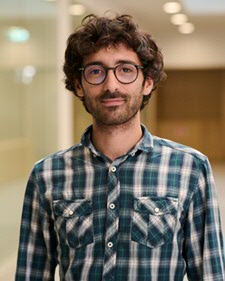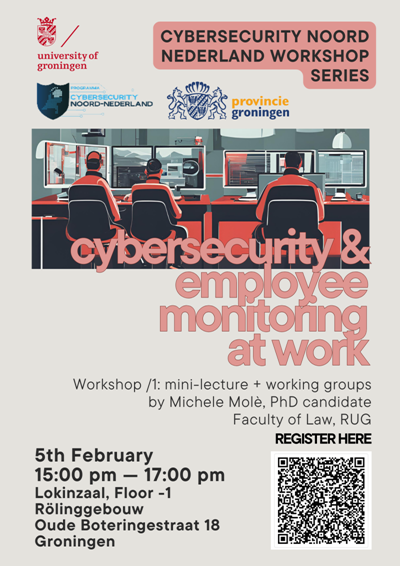Michele Molè talks about the upcoming CSNN workshop series

Over the next few months, a series of workshops on Labour law will take place in the Röling Building. What does that series entail and what is the overarching theme? We talked about it with Michele Molè, PhD researcher in Labour law at our Faculty.
First of all: what does CSNN stand for and what is its goal?
CSNN stands for Cybersecurity Noord-Nederland and is a consortium consisting of the Provincie Groningen, the Hanze, TNO and the UG. The goal is to accelerate development in the field of cybersecurity, train cybersecurity professionals and increase resilience of SME companies, among other things. Several CSNN projects are being implemented to achieve those goals.
What is the link between the CSNN workshops and the STeP Talks, that are also organized by you?
Both the general STeP Talks and the CSNN workshops that will take place at our Faculty this spring are organized by the STeP (Security, Technology and ePrivacy) research group at this faculty. The speakers at the CSNN workshops all conduct research that is part of the CSNN project, whereas the speakers at the general STeP Talks conduct research in other fields of law.
The CSNN workshops are part therefore of the bigger picture of STeP Talks, but can be seen as ‘special editions’ created by the CSNN consortium.
Can you take us through what a CSNN workshop will look like?
The workshops will be both theoretical and very interactive. They are meant to be informal meetings about the findings of the PhD candidates and postdocs that host them. The first one takes place next week, on Wednesday 5 February, and will be hosted by me.
What will you be talking about during that first workshop?
My research focuses on the regulation of workplace surveillance and new technologies in the EU, so that will be implemented into the workshop. Questions I ask in my research are: when does the form of AI that controls employee behavior play too big of a role? When is employee monitoring purely done to prevent cyber threats and when is it too much? Is it, for example, necessary for employers to monitor every website their employees visit during working hours?
In next four CSNN workshops my colleagues involved in the project will present their research on automated vehicles, health data, fintech and civil liability linked with cyberthreats. I will first present on 5 February the findings of my research and where I will explore the key legal challenges within the European legal framework, with particular attention to the GDPR and the AI Regulation. After that, we will all engage in an interactive segment where participants will have the opportunity to experiment with real employee monitoring software.
Sign up
The first CSNN workshop with Michele Molè will take place on Wednesday 5 February between 3 and 5 p.m. in the Lokinzaal of the Röling Building. Online attendance is also possible. You can sign up via the link below.

This article was published by the Faculty of Law.
More news
-
08 December 2025
Colourful Characters: Bert Röling
